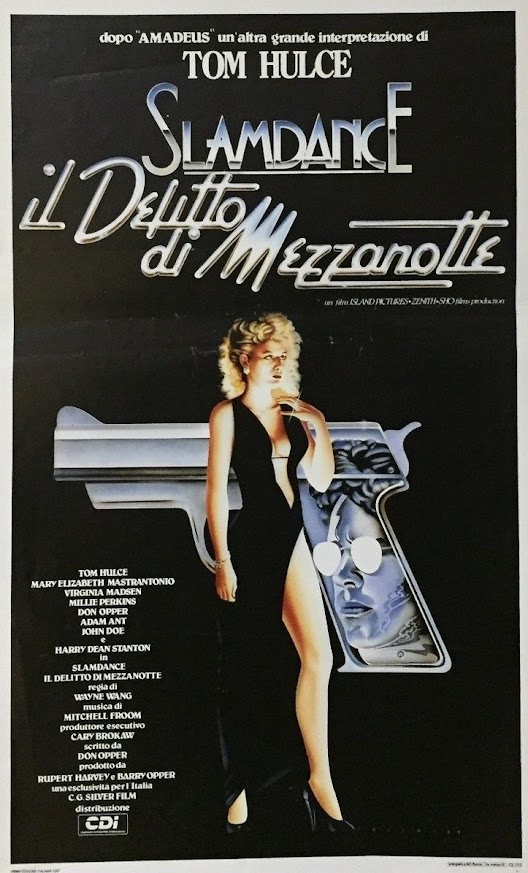SLAM DANCE (1987) ★ ★ ★
Here's how a scene from "Slam Dance" would look if it were filmed today:
A professional cartoonist comes home to find his apartment door tampered with. His face is frozen in a look of seriousness. His body slowly enters, turns on the lights, and he finds his place trashed. He notices a closet door closing, and suspects someone is hiding there. He carefully tip-toes his way towards it without making a sound, looking very serious. Still looking serious, he grabs the first thing he can find to defend himself, an umbrella. Looking ever-more serious, he reaches for the closet door. His hand closes on the doorknob, and suspenseful music shrills. He pauses so he can look serious, so, so serious, and slowly turns the knob. Cut to his face -- looking serious.
Now, here's how it actually plays with Tom Hulce as C.C. Drood, who happens to be a cartoonist:
A man comes home to find his apartment door tampered with. His face is puzzled, then slightly alarmed, yet it wavers on the edge of humor, like he half-suspects he's being pranked. He pokes his head in gingerly, then lets his whole body follow. He turns on the lights, and notices a closet door closing. He slowly approaches it, but not so carefully, and he steps on something that makes a loud noise, and startles himself. He glances at his feet self-deprecatingly. He grabs the first thing he can find to defend himself, an umbrella. He pauses to look at it, and begins to break out in laughter, but stifles it. Still looking like he could laugh at any moment, he reaches for the closet door. His hand is on the doorknob, and he doesn't wait to open it. A million things fall on him, and he yells, and looks pretty funny.
These are the moments in Wayne Wang's neo-noir thriller that make me miss the way movies use to be -- they used to be about people. Their characters were people. Quite often they were portrayed as ordinary people who had been thrust into extraordinary circumstances, which made them entertaining. But in the last fifteen years or so, Hollywood has drifted away from the kind of writing and the calibre of actor that depicts relatable people. Today we have the stone-faced Jennifer Lawrence and Chris Hemsworth school of acting, where if a character is described as "serious" on the page of a script, "serious" is the only dimension they are allowed to inhabit on screen.
Hulce's portrayal is far more intelligent than that, and it nearly saves this mediocre film. His character is depicted in such a nuanced and realistic manner that I wish they'd put him in something better. Drood is a failing cartoonist who tries to patch things up with his wife, played by Mary Elizabeth Mastrantonio. He also tries to forget his former mistress, Yolanda, played by Virginia Madsen. "Slam Dance" is a movie that uses these two women as plot devices for Drood's unlikely predicament. When he's framed for murder, he desperately digs through the past of one woman while seeking help from the other. Meanwhile he's stalked by a mysterious guy in a red Members Only jacket (Don Keith Opper), investigated by a detective (Harry Dean Stanton), and discovers he can't trust his only friend, Jim (Adam Ant).
Sound familiar? That's because it is. We've seen this formula a million times before, and this film does little to make us want to see it again. To say its scenarios are head-scratchers is an understatement. Take, for example, Drood's revelation that the police aren't playing fair with him. Does he do the obvious thing and hire a lawyer? No, of course not. Instead he lies, and runs. When Members Only guy goes to carry out a hit on Drood, that's when he fights and escapes, right? Wrong again. Instead, the least likely thing in the world happens, and Drood lives to see another day. He needs to, of course, or we wouldn't have a story. But the writing is so flimsy and hole-ridden in "Slam Dance" that I gave up keeping score on the absurdities by the thirty-minute mark.
While it certainly isn't a very good film, I can't overstate how effective Hulce's acting is. Despite the ridiculous story Drood finds himself in, he's played by an actor who knows how to act. Hulce lends the cartoonist a cartoonist's perspective on everything, and he's prone to bouts of sincere laughter in moments when a lesser actor would've played it straight. I'll leave you with this example: early on in the story, when Drood goes to the police to file a report against Members Only guy, the police make him "take a seat" and wait in the lobby. When they handcuff a big, burly Dennis Hayden to the chair next to him, he tells Drood he's going to "kill every fucking guy in here." Hulce's face crosses eleven different emotions in three seconds, and settles on a burst of laughter. How could a cartoonist not laugh in this situation? Oh, that's right -- give his part to one of the Hemsworths.
--- Bill Fontaine



